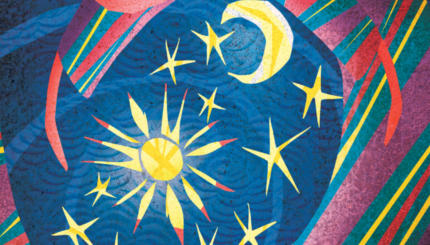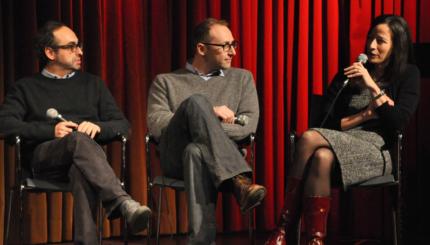Chaim Potok
Growing up as the daughter of two teachers, my parents encouraged me to read every kind of book that I was interested in. As a middle schooler I socialized with Charles Dickens, curled up with Jane Austen, ate snacks with the Bronte sisters, decided that I hated every stuffy Victorian who took 150 pages to start a plot, and moved on to their dark Russian cousins, the Tolstoys and Dostoevskys (125 pages to start a plot). One author was off-limits in my house, and his books I had to keep hidden. I kept his books behind the other books on my shelves, binding face-down. This author was Chaim Potok. I actually had no idea why there was a Chaim Potok ban in my house until I started reading his books, and then the CPB (Chaim Potok Ban) made a lot of sense to me. Potok claimed that one could not be Orthodox, or more accurately, one could not fulfill himself creatively and be Orthodox at the same time. And when faced with this decision, one should choose creative fulfillment. Potok made this point in
My Name is Asher Lev
,
Davida’s Harp
, and pretty much every other book he had written.
I don’t blame my parents for this ban at all. Every parent has something, I’m sure, that they want to protect their children from. I want to protect my children from Sholom Auslander, author of
Foreskin’s Lament
, in which he blames his apostasy on the “theological abuse” he suffered as a child at the hands of Orthodox parents and teachers. I pray every day that they should never read one of his books. I know that they will be exposed to anti-religious ideas out there in the real world, but by God, if they are exposed to all those ideas through the tortured, cynical eyes of Sholom Auslander, I will do serious penance. My children will make their own decisions as they get older about what kinds of Jews they want to be, but I don’t want them to arrive at that decision through rage and through pain.
I think my parents were right in trying to protect me from the most devastating reality of being an Orthodox Jew: There are simply some people who cannot be both an Orthodox Jew and creatively fulfill themselves. This may not be devastating to you, but it was to me, and my 1994-future-Broadway-star/pianist self.
Every day I go through mind tricks to calm myself down when I worry that I am not fulfilled creatively. I yell at myself in my brain. I remind myself of my healthy children, my healthy husband, my healthy body (bli ayin hara). I remind myself that my life is wonderful. I have friends that laugh with me, and at me (and both are good things). I remind myself that there is a lot of instability in the world, and a lot of uncertainty and pain, and my children are more fortunate than most other children to have been sheltered from this uncertainty and pain. I remind myself that creative fulfillment is a luxury.
I remind myself that I create art when I teach. And when I write. I remind myself that the very act of conducting my life within a controlled, halakhic environment – that is art.
Five or six years ago, I participated in a small conference of Orthodox educators run by Rabbi Aryeh Klapper in Boston. After a panel presentation, a female attendee at the conference raised her hand and began to lament all the difficulties of her life, and how hard it is that she will never be able to fulfill her dream of becoming a rabbi. I nodded in empathy but supplemented her comments with a statement about how I will never fulfill myself musically – and that I was coming to terms with that.
I never wanted to be a rabbi. I wanted to be Gwen Stefani.
All I said was that I was coming to terms with it, not that I already had. I have entered into a Chaim Potok book, but I’ve chosen the other path — Orthodox Judaism. I will not be a singer, or a pianist (too many gigs on Friday nights and Saturdays). I have chosen a halakhic path. If I had to do it again, I would make the same choice. But I don’t want my daughters to have to make this choice. I want (and here my cursor stays for 45 seconds – what do I want?)
I want my children to express their Judaism in a way that completely and totally creatively fulfills them.
I know some readers of this blog will point out to me that many Orthodox women sing or perform in front of men, but I am not looking for halakhic loopholes or possibilities. I’m waiting until they become mainstream. I know, I know, when there is a rabbinic will there is a halakhic way – but I don’t want to fashion my Judaism according to my will. Self-control is a form of artistic expression. Or so I tell myself.
So for now, here I am, in Potok’s book. I’ve also decided to let my children read actual Chaim Potok books and hope that my own personal choices stand as a (sometimes painful) alternative. But the benefits and the beauty of living as an Orthodox Jewish woman outweigh the fulfillment that I have skipped out on. Maybe. And who knows, one day I might even let Sholom Auslander’s books into my house.
Not anytime soon, though.



